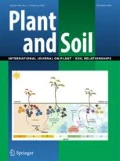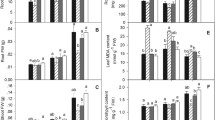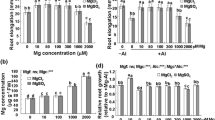Abstract
Aims
Populus can tolerant high concentration Al stress. However, the mechanisms of Mg alleviation to Al toxicity in populus remain unknown.
Methods
In the present study, adequate Mg was supplied to poplar under high concentration Al toxicity stress, and the pH gradients of root surface, Mg and Al uptake from root apex were detected using electrophysiological analysis, fluorescence staining, etc. Furthermore, auxin distribution and transport dynamic kinetics in root tips were also detected.
Results
In the present study, we found that adequate supply of Mg alleviated high concentration Al toxicity to populus root growth. Mg promoted the pH gradients of root surface in populus, leading to alkalization in the root transition zone, which prevented Al toxicity to root elongation. The auxin distribution in root tips of populus was detected using DR5:GFP reporter. The transport and distribution of polar auxin in root transition zone were inhibited by Al toxicity, but partially alleviated by Mg supply. Further electrophysiological experiments using auxin transporter mutant pin-formed 2 (pin2) showed that Mg alleviated Al toxicity by PIN2-based polar auxin transport, which regulated root surface alkalization in the transition zone. Transcriptomic analysis and yeast complementation experiments using mrs2 mutants also reveals same relationships among Mg, auxin and Al.
Conclusions
The present study suggests that Mg promotes polar auxin transport and distribution, which leads to the elevated root surface pH regulation, and further alleviates the Al toxicity. Our results partially clarify the mechanism of Mg in alleviating the toxicity of high concentration Al in woody plants.








Similar content being viewed by others
References
Bagatharia SB, Chanda SV (1998) Changes in peroxidase and IAA oxidase activities during cell elongation in Phaseolus hypocotyls. Acta Physiol Plant 20(1):9–13
Basu U, Good AG, Aung T, Slaski JJ, Basu A, Briggs KG, Taylor GJ (1999) A 23-kDa, root exudate polypeptide co-segregates with aluminum resistance in Triticum aestivum. Physiol Plant 106:53–61
Beffa R, Martin HV, Pilet P-E (1990) In vitro oxidation of Indoleacetic acid by soluble Auxin-oxidases and peroxidases from maize roots. Plant Physiol 94:485–491
Benjamins R, Scheres B (2008) Auxin: the looping star in plant development. Annu Rev Plant Biol 59:443–465
Bose J, Babourina O, Shabala S, Rengel Z (2013) Low-pH and aluminum resistance in Arabidopsis correlates with high cytosolic magnesium content and increased magnesium uptake by plant roots. Plant & Cell Physiology
Brauer D (2001) Rapid inhibition of root growth in wheat associated with aluminum uptake as followed by changes in Morin fluorescence. J Plant Nutr 24:1243–1253. https://doi.org/10.1081/pln-100106979
Cakmak I (2013) Magnesium in crop production, food quality and human health. Plant Soil 368:1–4. https://doi.org/10.1007/s11104-013-1781-2
Chandran D, Sharopova N, Vandenbosch KA, Garvin DF, Samac DA (2008) Physiological and molecular characterization of aluminum resistance in Medicago truncatula. BMC Plant Biol 8:89
Chen ZC, Ma JF (2013) Magnesium transporters and their role in Al tolerance in plants. Plant Soil 368:51–56. https://doi.org/10.1007/s11104-012-1433-y
Chen ZC, Yamaji N, Motoyama R, Nagamura Y, Ma JF (2012) Up-regulation of a magnesium transporter gene OsMGT1 is required for conferring aluminum tolerance in rice. Plant Physiol 159:1624–1633. https://doi.org/10.1104/pp.112.199778
Degenhardt J, Larsen PB, Howell SH, Kochian LV (1998) Aluminum resistance in the Arabidopsis mutant alr-104 is caused by an aluminum-induced increase in Rhizosphere pH. Plant Physiol 117:19–27
Delhaize E, Gruber BD, Ryan PR (2007) The roles of organic anion permeases in aluminium resistance and mineral nutrition. FEBS Lett 581:2255–2262
Delhaize E, Ma JF, Ryan PR (2012) Transcriptional regulation of aluminium tolerance genes. Trends Plant Sci 17:341–348. https://doi.org/10.1016/j.tplants.2012.02.008
Delhaize E, Ryan PR (1995) Aluminum toxicity and tolerance in plants. Plant Physiol 107:315–321
Deng W, Luo K, Li D, Zheng X, Wei X, Smith W, Thammina C, Lu L, Li Y, Pei Y (2006) Overexpression of an Arabidopsis magnesium transport gene, AtMGT1, in Nicotiana benthamiana confers Al tolerance. J Exp Bot 57:4235–4243. https://doi.org/10.1093/jxb/erl201
Duressa D, Soliman KM, Chen D (2010) Mechanisms of magnesium amelioration of aluminum toxicity in soybean at the gene expression level. Genome 53:789–797
Ehlert C, Plassard C, Cookson SJ, Tardieu F, Simonneau T (2011) Do pH changes in the leaf apoplast contribute to rapid inhibition of leaf elongation rate by water stress? Comparison of stress responses induced by polyethylene glycol and down-regulation of root hydraulic conductivity. Plant Cell Environ 34:1258–1266. https://doi.org/10.1111/j.1365-3040.2011.02326.x
Eticha D, Staß A, Horst WJ (2005a) Localization of aluminium in the maize root apex: can morin detect cell wall-bound aluminium? J Exp Bot 56:1351
Eticha D, Stass A, Horst WJ (2005b) Localization of aluminium in the maize root apex: can morin detect cell wall-bound aluminium? J Exp Bot 56:1351–1357. https://doi.org/10.1093/jxb/eri136
Felle HH, Hanstein S (2002) The apoplastic pH of the substomatal cavity of Vicia faba leaves and its regulation responding to different stress factors. J Exp Bot 53:73–82
Feng MJ, Hiradate S, Matsumoto H (1998) High aluminum resistance in buckwheat. Ii. Oxalic acid detoxifies aluminum internally. Plant Physiol 117:753–759
Fernández-Marcos M, Sanz L, Lewis DR, Muday GK, Lorenzo O (2011) Nitric oxide causes root apical meristem defects and growth inhibition while reducing PIN-FORMED 1 (PIN1)-dependent acropetal auxin transport. Proc Natl Acad Sci U S A 108:18506
Friml J, Wisniewska J (2005) Auxin as intercellular signal
Göransson A, Eldhuset TD (1987) Effects of aluminium on growth and nutrient uptake of Betula pendula seedlings. Physiol Plant 69:193–199
Göransson A, Eldhuset TD (1991) Effects of aluminium on growth and nutrient uptake of small Picea abies and Pinus sylvestris plants. Trees 5:136–142
Grabherr MG, Haas BJ, Yassour M, Levin JZ, Thompson DA, Amit I, Adiconis X, Fan L, Raychowdhury R, Zeng Q (2011) Full-length transcriptome assembly from RNA-Seq data without a reference genome. Nat Biotechnol 29:644
Grisel N, Zoller S, Künzli-Gontarczyk M, Lampart T, Münsterkötter M, Brunner I, Bovet L, Métraux J-P, Sperisen C (2010) Transcriptome responses to aluminum stress in roots of aspen (Populus tremula). BMC Plant Biol 10:185
Hermans C, Conn SJ, Chen J, Xiao Q, Verbruggen N (2013) An update on magnesium homeostasis mechanisms in plants. Metallomics : integrated biometal science 5:1170–1183. https://doi.org/10.1039/c3mt20223b
Hermans C, Vuylsteke M, Coppens F, Cristescu SM (2010) System analysis of the responses to long term magnesium deficiency and restoration in Arabidopsis thaliana. New Phytol 187:132–144. https://doi.org/10.1111/j.1469-8137.2010.03257.x
Kinraide TB (1991) Identity of the rhizotoxic aluminium species. Plant Soil 134:167–178
Kinraide TB, Parker DR, Zobel RW (2005) Organic acid secretion as a mechanism of aluminium resistance: a model incorporating the root cortex, epidermis, and the external unstirred layer. J Exp Bot 56:1853
Kinraide TB, Ryan PR, Kochian LV (1994) Al3+-Ca2+interactions in aluminum rhizotoxicity: II. Evaluating the Ca2+−displacement hypothesis. Planta 192(1):104–109
Kochian LV (1995) Cellular mechanisms of aluminum toxicity and resistance in plants. Annu Rev Plant Physiol Plant Mol Biol 46:237–260. https://doi.org/10.1146/annurev.pp.46.060195.001321
Kochian LV, Hoekenga OA, Pineros MA (2004) How do crop plants tolerate acid soils? Mechanisms of aluminum tolerance and phosphorous efficiency. Annu Rev Plant Biol 55:459–493. https://doi.org/10.1146/annurev.arplant.55.031903.141655
Kochian LV, Pineros MA, Liu J, Magalhaes JV (2015) Plant adaptation to acid soils: the molecular basis for crop aluminum resistance. Annu Rev Plant Biol 66:571–598. https://doi.org/10.1146/annurev-arplant-043014-114822
Kopittke PM (2016) Role of phytohormones in aluminium rhizotoxicity. Plant Cell Environ 39:2319–2328
Kopittke PM, Katie LM, Enzo L, Alessandra G, Brett JF, Pax CB, Neal WM, Timothy MN, Brigid AM, Peng W, Peter MG, George K, Richard IW, Kathryn G, Alina T (2015) Identification of the primary lesion of toxic aluminum in plant roots. Plant Physiol 167:1402–1411
Kumari M, Taylor GJ, Deyholos MK (2008) Transcriptomic responses to aluminum stress in roots of Arabidopsis thaliana. Mol Gen Genomics 279:339–357
Li L, Tutone AF, Drummond RSM, Gardner RC, Luan S (2001) A novel family of magnesium transport genes in Arabidopsis. Plant Cell 13:2761–2775. https://doi.org/10.1105/tpc.010352
Li N, Meng H, Xing H, Liang L, Zhao X, Luo K (2017) Genome-wide analysis of MATE transporters and molecular characterization of aluminum resistance in Populus. J Exp Bot 68:5669–5683. https://doi.org/10.1093/jxb/erx370
Li N, Xiao H, Sun J, Wang S, Wang J, Chang P, Zhou X, Lei B, Lu K, Luo F, Shi X, Li J (2018a) Genome-wide analysis and expression profiling of the HMA gene family in Brassica napus under cd stress. Plant Soil 426:365–381. https://doi.org/10.1007/s11104-018-3637-2
Li R, Yu C, Li Y, Lam TW, Yiu SM, Kristiansen K, Wang J (2009) SOAP2: an improved ultrafast tool for short read alignment. Bioinformatics 25:1966–1967
Li X, Li Y, Mai J, Tao L, Qu M, Liu J, Shen R, Xu G, Feng Y, Xiao H, Wu L, Shi L, Guo S, Liang J, Zhu Y, He Y, Baluska F, Shabala S, Yu M (2018b) Boron alleviates aluminum toxicity by promoting root alkalization in transition zone via polar Auxin transport. Plant Physiol 177:1254–1266. https://doi.org/10.1104/pp.18.00188
Liu J, Magalhaes JV, Shaff J, Kochian LV (2009) Aluminum-activated citrate and malate transporters from the MATE and ALMT families function independently to confer Arabidopsis aluminum tolerance. The Plant journal : for cell and molecular biology 57:389–399. https://doi.org/10.1111/j.1365-313X.2008.03696.x
Ma JF (2007) Syndrome of aluminum toxicity and diversity of aluminum resistance in higher plants. Int Rev Cytol 264:225–252. https://doi.org/10.1104/pp.17.01559
MacDiarmid CW, Cardner RC (1996) AI toxicity in yeast. Plant Physiol 112:1101–1109
Mambro RD, Ruvo MD, Pacifici E, Salvi E, Sozzani R, Benfey PN, Busch W, Novak O, Ljung K, Paola LD, Marée AFM, Costantino P, Grieneisen VA, Sabatini AS (2017) Auxin minimum triggers the developmental switch from cell division to cell differentiation in the Arabidopsis root. Proc Natl Acad Sci U S A 114:E7641–E7649. https://doi.org/10.1073/pnas.1705833114
Mancuso S, Marras AM, Magnus V, Baluška F (2005) Noninvasive and continuous recordings of auxin fluxes in intact root apex with a carbon nanotube-modified and self-referencing microelectrode. Anal Biochem 341:344–351. https://doi.org/10.1016/j.ab.2005.03.054
Mccown BH, Lloyd G (1981) Woody Plant medium (WPM)-a mineral nutrient formulation for microculture for woody plant species
Ottenschlaäger I, Wolff P, Wolverton C, Bhalerao RP, Sandberg GR, Ishikawa H, Evans M, Palme K (2003) Gravity-regulated differential auxin transport from columella to lateral root cap cells. PNAS 100:2987–2991
Palmgren MG, Harper JF (1999) Pumping with plant P-type ATPases. J Exp Bot 50:883–893. https://doi.org/10.1093/jexbot/50.suppl_1.883
Pan X, Chen J, Yang Z (2015) Auxin regulation of cell polarity in plants. Curr Opin Plant Biol 28:144–153. https://doi.org/10.1016/j.pbi.2015.10.009
Pellet DM, Paperni LA, Kochian LV (1996) Multiple aluminum-resistance mechanisms in wheat. Plant Physiol 112:591–597
Pitann B, Kranz T, Muhling KH (2009) The apoplastic pH and its significance in adaptation to salinity in maize (Zea mays L.): comparison of fluorescence microscopy and pH-sensitive microelectrodes. Plant science : an international journal of experimental plant biology 176:497–504. https://doi.org/10.1016/j.plantsci.2009.01.002
Poschenrieder G, Corrales B (2008) A glance into aluminum toxicity and resistance in plants. Sci Total Environ 400(1–3):356–368
Rayle DL, Cleland RE (1992) The acid growth theory of Auxin-induced cell elongation is alive and Well1. Plant Physiol 99:1271–1274
Růžička K, Ljung K, Vanneste S, Podhorská R, Beeckman T, Friml J, Benková E (2007) Ethylene regulates root growth through effects on Auxin biosynthesis and transport-dependent Auxin distribution. Plant Cell 19:2197–2212. https://doi.org/10.1105/tpc.107.052126
Sabatini S, Beis D, Wolkenfelt H, Murfett J, Guilfoyle T, Malamy J, Benfey P, Leyser O, Bechtold N, Weisbeek P, Scheres B (1999) An Auxin-dependent distal organizer of pattern and polarity in the Arabidopsis root. Cell 99:463–472
Schaedle M, Thornton FC, Raynal DJ, Tepper HB (1989) Response of tree seedlings to aluminum. Tree Physiol 5:337–356
Schlicht M, Strnad M, Scanlon MJ, Mancuso S, Hochholdinger F, Palme K, Volkmann D, Menzel D, Baluska F (2006) Auxin Immunolocalization implicates vesicular neurotransmitter-like mode of polar Auxin transport in root apices. Plant Signal Behav 1(3):122–133
Schock I, Gregan J, Steinhauser S, Schweye R, Brennicke A, Knoop V (2000) A member of a novel Arabidopsis thaliana gene family of candidate Mg2+ ion transporters complements a yeast mitochondrial group II intron-splicing mutant. Plant J 24(4):489–501
Shaul O (2002) Magnesium transport and function in plants: the tip of the iceberg. BioMetals 15:309–323
Shaul O, Hilgemann DW, de Almeida-Engler J, Montagu MV, Inzé D, Galili AG (1999) Cloning and characterization of a novel Mg2+/H+ exchanger. European Molecular Biology Organization 18:3971–3980
Shen H, Hou N, Schlicht M, Wan Y, Mancuso S, Baluska F (2008) Aluminium toxicity targets PIN2 in Arabidopsis root apices: effects on PIN2 endocytosis, vesicular recycling, and polar auxin transport. Science Bulletin 53:2480–2487. https://doi.org/10.1007/s11434-008-0332-3
Shen R, Ma JF, Kyo M, Iwashita T (2002) Compartmentation of aluminium in leaves of an Al-accumulator, Fagopyrum esculentum Moench. Planta 215:394–398. https://doi.org/10.1007/s00425-002-0763-z
Silva IR, Smyth TJ, Israel DW, Raper CD, Rufty TW (2001) Magnesium is more efficient than calcium in alleviating aluminum Rhizotoxicity in soybean and its ameliorative effect is not explained by the Gouy-chapman-stern model. Plant & cell physiology 42(5):538–545
Sivaguru M, Horst WJ (1998) The distal part of the transition zone is the most aluminum-sensitive apical root zone of maize. Plant Physiol 116:155–163
Staal M, Cnodder TD, Simon D, Vandenbussche F, Straeten DVD, Verbelen J-P, Elzenga T, Vissenberg K (2011) Apoplastic Alkalinization is instrumental for the inhibition of cell elongation in the Arabidopsis root by the ethylene precursor 1-Aminocyclopropane-1-carboxylic acid. Plant Physiol 155:2049–2055. https://doi.org/10.1104/pp.110.168476
Stepanova AN, Hoyt JM, Hamilton AA, Alonso JM (2005) A link between ethylene and Auxin uncovered by the characterization of two root-specific ethylene-insensitive mutants in Arabidopsis. Plant Cell 17:2230–2242. https://doi.org/10.1105/tpc.105.033365
Swarup R, Perry P, Hagenbeek D, Straeten DVD, Beemster GTS, Gr S, Bhalerao R, Ljung K, Bennett MJ (2007) Ethylene Upregulates Auxin biosynthesis in Arabidopsis seedlings to enhance inhibition of root cell elongation. Plant Cell 19:2186–2196. https://doi.org/10.1105/tpc.107.052100
Sze H, Li X, Palmgren MG (1999) Energization of plant cell membranes by H+-pumping ATPases: regulation and biosynthesis. Plant Cell 11:677–689
Tan K, Keltjens WG, Findenegg GR (1992) Aluminium toxicity with sorghum genotypes in nutrient solutions and its amelioration by magnesium. Angenommen 115:81–86
Terrile MC, Paris R, Calderon-Villalobos LI, Iglesias MJ, Lamattina L, Estelle M, Casalongue CA (2012) Nitric oxide influences auxin signaling through S-nitrosylation of the Arabidopsis transport inhibitor response1 auxin receptor. The Plant journal : for cell and molecular biology 70:492–500. https://doi.org/10.1111/j.1365-313X.2011.04885.x
Tian QY, Sun DH, Zhao MG, Zhang WH (2007) Inhibition of nitric oxide synthase (NOS) underlies aluminum-induced inhibition of root elongation in Hibiscus moscheutos. The New phytologist 174:322–331. https://doi.org/10.1111/j.1469-8137.2007.02005.x
Tice KR, Parker DR, DeMason DA (1992) Operationally defined Apoplastic and Symplastic aluminum fractions in root tips of aluminum-intoxicated wheat. Plant Physiol
Vanneste S, Friml J (2009) Auxin: a trigger for change in plant development. Cell 136:1005–1016. https://doi.org/10.1016/j.cell.2009.03.001
Visscher AM, Paul A-L, Kirst M, Guy CL (2010) Growth performance and root Transcriptome remodeling of Arabidopsis in response to Mars-like levels of magnesium sulfate. PLoS One 5(8):e12348. https://doi.org/10.1371/journal.pone.0012348
Wan Y, Jasik J, Wang L, Hao H, Volkmann D, Menzel D, Mancuso S, Baluška F, Lin J (2012) The signal transducer NPH3 integrates the Phototropin1 Photosensor with PIN2-based polar Auxin transport in Arabidopsis root phototropism. Plant Cell 24:551–565. https://doi.org/10.1105/tpc.111.094284
Wang H-H, Huang J-J, Bi Y-R (2010) Nitrate reductase-dependent nitric oxide production is involved in aluminum tolerance in red kidney bean roots. Plant Sci 179:281–288. https://doi.org/10.1016/j.plantsci.2010.05.014
Wang P, Yang C, Chen H, Song C, Zhang X, Wang D (2017) Transcriptomic basis for drought-resistance in Brassica napus L. Sci Rep 7:40532. https://doi.org/10.1038/srep40532
Wang Q, Nian F, Zhao L, Li F, Yang H, Yang Y (2013) Exogenous indole-3-acetic acid could reduce the accumulation of aluminum in root apex of wheat (Triticum aestivum L.) under Al stress. J Soil Sci Plant Nutr 13:534–543
Watanabe T, Okada K (2005) Interactive effects of Al, Ca and other cations on root elongation of rice cultivars under low pH. Ann Bot 95:379–385. https://doi.org/10.1093/aob/mci032
Yang JL, You JF, Li YY, Wu P, Zheng SJ (2007) Magnesium enhances aluminum-induced citrate secretion in rice bean roots (Vigna umbellata) by restoring plasma membrane H+-ATPase activity. Plant & Cell Physiology 48:66–73. https://doi.org/10.1093/pcp/pcl038
Yang Y, Wang QL, Geng MJ, Guo ZH, Zhao Z (2011) Effect of indole-3-acetic acid on aluminum-induced efflux of malic acid from wheat (Triticum aestivum L.). Plant Soil 346:215–230. https://doi.org/10.1007/s11104-011-0811-1
Ye J, Fang L, Zheng H, Zhang Y, Chen J, Zhang Z, Wang J, Li S, Li R, Bolund L (2006) WEGO: a web tool for plotting GO annotations. Nucleic Acids Res 34:W293–W297
Zheng SJ, Yang JL (2005) Target sites of aluminum phytotoxicity. Biol Plant 43(3):321–331
Zhu XF, Lei GJ, Wang ZW, Shi YZ, Braam J, Li GX, Zheng SJ (2013) Coordination between apoplastic and symplastic detoxification confers plant aluminum resistance. Plant Physiol 162:1947–1955. https://doi.org/10.1104/pp.113.219147
Zhu XF, Shi YZ, Lei GJ, Fry SC, Zhang BC, Zhou YH, Braam J, Jiang T, Xu XY, Mao CZ, Pan YJ, Yang JL, Wu P, Zheng SJ (2012) XTH31, encoding an in vitro XEH/XET-active enzyme, regulates aluminum sensitivity by modulating in vivo XET action, cell wall xyloglucan content, and aluminum binding capacity in Arabidopsis. Plant Cell 24:4731–4747. https://doi.org/10.1105/tpc.112.106039
Acknowledgements
This work was supported by National Key R &D Program of China (2017YFD200203; 2018YFD0800600), Fundamental Research Funds for the Central Universities (XDJK2018C095; XDJK2017B030; SWU116021; SWU118114; SWU115018) and National Natural Science Foundation of China (31870587; 31400063; 31500038) .
Author information
Authors and Affiliations
Contributions
ZZ and NL designed and conceived the study and drafted the manuscript. ZZ, HM, FH and SL performed experiments and data analysis. All authors have read and approved the final manuscript.
Corresponding authors
Ethics declarations
Competing interests
The authors declare that they have no competing interests.
Additional information
Responsible Editor: Juan Barcelo.
Publisher’s note
Springer Nature remains neutral with regard to jurisdictional claims in published maps and institutional affiliations.
Highlight
Our research reveals that magnesium alleviates high concentration aluminum toxicity by promoting polar auxin transport and distribution, which regulated root surface alkalization in the transition zone of populus root apex
Electronic supplementary material
ESM 1
(DOCX 1095 kb)
Rights and permissions
About this article
Cite this article
Zhang, Z., Liu, D., Meng, H. et al. Magnesium alleviates aluminum toxicity by promoting polar auxin transport and distribution and root alkalization in the root apex in populus. Plant Soil 448, 565–585 (2020). https://doi.org/10.1007/s11104-020-04459-7
Received:
Accepted:
Published:
Issue Date:
DOI: https://doi.org/10.1007/s11104-020-04459-7




